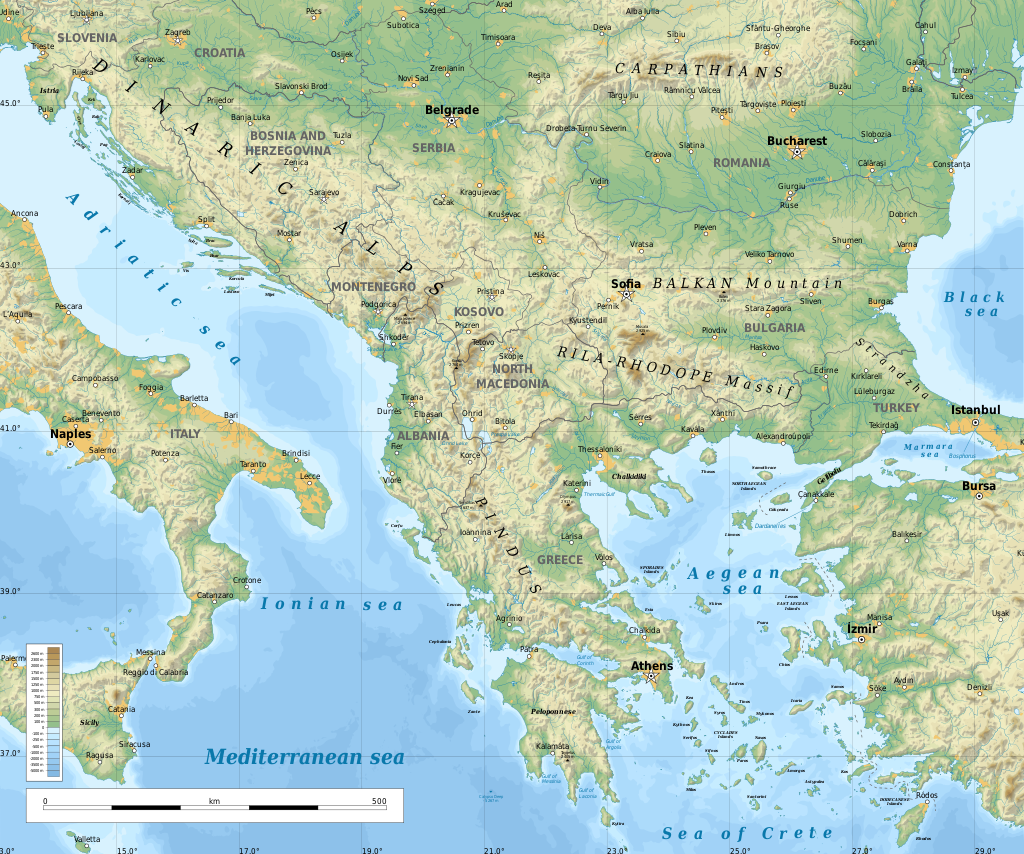by MARKO ŽUNJIĆ
The foundations on which the modern Turkish state rests have been reexamined after the Cold War, including the aspect of Turkey’s role in international relations, with emphasis on its approach to neighboring regions. The role and global position of the Republic of Turkey have been criticized by internal political actors since the period of the Cold War made this country passive in international relations, and this passivization continued even after the end of this period (Davutoglu 2014, 105). The wars in the Balkans during the 1990s changed Turkey’s approach to the region and made it more active (Ajzenhamer and Trapara 2013, 2).
Turkey got involved in the events in the region right when the wars started, taking the position of an important actor that was ready to deal with the issues of the Balkans despite its internal problems. In the conflicts in Yugoslavia, Turkey initially was against fragmentation and separatism since it faced separatist aspirations on its own territory (problems with the Caucasus and the Kurdish question). However, the Turkish public was not indifferent to the suffering of the Bosniaks, and as the conflict intensified, demands for the state’s reaction grew. Turkey very quickly changed its policy towards the war and started lobbying for a stronger reaction from NATO and the international community. Ankara focused its activity on improving the position of Bosniaks in the war, trying to lift the embargo on the supply of arms to Bosnia and Herzegovina in favor of Bosnia and Herzegovina, arguing such a position with the fact that Yugoslavia has sufficient supplies to completely ethnically cleanse the area affected by the war (Demirtaş 2011, 9). In addition, Turkey mediated the peace negotiations between Bosniaks and Serbs, thereby enabling the end of the war, which is particularly significant because Bosniaks had not believed in the peace process until Turkey became its guarantor (Keskin 2003, 39-40).
After 2002, the Justice and Development Party (AKP) came to power in the Republic of Turkey. Turkish high officials used this engagement in the Balkans during the 1990s as an argument to justify the need for a greater and more significant presence in the international system, either before the domestic audience or at the international level. The government programs of the Turkish prime ministers from 2002 to 2009, Abdullah Gül and Recep Tayyip Erdoğan, defined the policy towards the Balkan region through aspirations for change in the historical and cultural context: “Our Balkan policy will be developed and, if necessary, reshaped in the light of our historical, cultural and economic relations with the countries in the region. Economically oriented projects will be developed to create areas of common interest to reduce tensions in the region and make a peaceful environment permanent” (Abdullah Gül 2002); later prime minister Erdoğan during speech on the presentation of his government’s program made exactly the same statement (Recep Tayyip Erdoğan 2003).
Gradually, a new ideological approach that was developed, Neo-Ottomanism, which was summarized in the Strategic Depth by Ahmet Davutoğlu, Turkey’s former foreign minister and prime minister, became emphasized throughout Turkish discourse. The new ideology sought to redefine the basis of modern Turkish society, by restoring tradition and the importance of religion in the identity of Turks and by including elements of the Ottoman identity in modern Turkish identification. In the foreign policy and security perspective, the new aspiration implied the return of Turkey’s lost influence, especially in the areas that were once under the rule of the Ottoman Empire, such as the Balkans (Tanasković 2010, 11). In the post-war context that meant that Turkish success in peacebuilding processes in the Balkans could be used as the base for a new, redefined role in the international system.
In their speeches, Turkish officials often referred to Turkey’s role as a guardian of peace in the Balkans and a guarantor of stability. The result of this policy was aimed to be the creation of a security zone around Turkey, which will ensure national peace within the country, supported by bilateral ties and regional initiatives that lead to dialogue and peaceful resolution of problems. Prime Minister Erdoğan described it in the following way: “Our main goal was to transform Turkey from a defensive country that reacts to crises and transform it into a decision-making actor that can direct the development of international relations with its regional and global vision. The primary condition for achieving this goal is strengthening economic, cultural and political ties with neighboring countries and creating a circle of security and prosperity around our country” (Recep Tayyip Erdoğan 2007).
The Balkans is an important point of reference that is used in the discourse of Turkey in order to restore the values that characterized the Ottoman period in the history of the Turkish people to the identity of Turkey through it and the foreign policy practice. This use of the Balkans in the discourse has significant consequences for the formation of foreign policy decisions towards the states of the region. The Republic of Turkey underwent a transformation in its global perception. Initially seen as a passive and marginal state after the Cold War, it transitioned into actor that was recognized for its active role as a regional leader. Turkey was perceived and also identified herself as a guardian of the region, representative of Muslim interests and protector of the Ottoman heritage in the Balkans. Eventually, in the period between 2002 and 2009, Turkey was viewed as a key player in maintaining regional stability and a contributor to global peace (Petrović and Reljić 2011, 168–170).
The survival of the Turkish state, as it was in the early 2000s, began to be questioned primarily due to various challenges that were a feature not only of Turkey’s internal politics, but also of the unstable regions it’s surrounded by. Reduced influence and the neglect of crucial regional concerns posed a potential hazard for Turkey, especially given its context within an inherently unstable regional landscape. Instabilities in this sense could very easily be transferred to the internal political order in Turkey, which would undermine not only the stability of its government but also its global and regional status and aspirations, identity and ideology. The presence of those conditions facilitated the emergence of arguments and reasons for supporting the increased Turkish role in the surrounding regions within Turkish official security and foreign policy discourses. In relation to this, Prime Minister Erdoğan stated “We will continue to solve problems and challenges with courage, determination and common sense. The moment we give up, Turkey will be the loser. We will not give up. We will never allow Turkey to lose and be a loser” (Recep Tayyip Erdoğan 2009). The Prime Minister’s statement refers to many activities carried out by Turkey in its surrounding regions. If it were to withdraw from its engagement and experience a certain type of failure in some regional project or initiative, it would have a negative impact on its self-perception of the state’s capabilities, and would further threaten its status that it has acquired in international relations.
The goal of such performances was to justify the investment of larger funds in foreign policy and security engagement. Gül, in his capacity as Minister of Foreign Affairs, used the narrative of the wars in the Balkans to emphasize that Turkey is really burdened by the development of events in its close regions and warned that its foreign policy cannot be reactive, nor caused by circumstances, but proactive and on constant vigilance (Abdullah Gül 2003).
The Balkans is an important reference point that is used in the discourse of Turkey in order to restore the values that characterized the Ottoman period in the history of the Turkish people to the identity of Turkey through it and foreign policy practice. This use of the Balkans in the discourse has significant consequences for the formation of foreign policy decisions towards the states of the region. The result is the increased regional role of Turkey and the intensification of its foreign policy, which from 2009 to 2016 can be characterized as extremely proactive. Accordingly, Turkey has become a more active participant in the security and foreign policy dynamics between regional actors and, based on the statements of its top officials, has taken significant credit for preserving peace and stability in the region and the world (Vecdi Gönül 2009; Arežina 2018; Lami 2020).
References
Abdullah, Gül. 2002. Program of the Council of Ministers. T. B. M. M. (Grand National Assembly of Turkey). November 23. Plenary Session, https://www.tbmm.gov.tr/Tutanaklar/Tutanak?Id=2c83289d-f169-49a9-b23d-0185ceac7b83.
Abdullah, Gül. 2003. On behalf of the government. T. B. M. M. (Grand National Assembly of Turkey). March 26th. Plenary Session, https://cdn.tbmm.gov.tr/TbmmWeb/Tutanak20230120/22/1/56/Tam/437fe3e5-687d-4f52-9000-b1880a6a224f.html.
Ajzenhamer, Vladimir, and Vladimir Trapara. 2013. “Turska politika prema Srbiji i Zapadnom Balkanu u kontekstu aktuelnih međunarodnih i regionalnih trendova.” Srbija u Jugoistočnoj Evropi: zbornik radova, 1–17. Beograd: Institut za međunarodnu politiku i privredu.
Arežina, Sanja. 2018. Turkish Foreign Policy Towards Balkans and Serbia Under Davutoğlu Administration. Marmara University Journal of Political Science 6 (2): 203–216.
Davutoğlu, Ahmet. 2014. Strategijska dubina: međunarodni položaj Turske, prev. Senka Ivošević Ipek. Beograd: Službeni glasnik.
Demirtaş, Birgül. 2011. “Turkish Foreign Policy Toward The Bosnian War (1992–1995): A Constructivist Analysis.” Karadeniz Araştırmaları Merkezi.
Keskin, Recep. 2003. The dispute between Bosnian Muslims and Serbs. San Bernardino: Faculty of California State University.
Lami, Blendi. 2018. Recalibration Of Turkish Foreign Policy During AKP Era. Central European Journal of International and Security Studies 12 (3): 35–56.
Petrović, Žarko, and Dušan Reljić. 2011. “Turkish Interests and Involvement in the Western Balkans: A Score-Card.” Insight Turkey 13 (3): 159–172.
Minister Recep Tayyip Erdogan. T. B. M. M. (Grand National Assembly of Turkey). March 18th. Plenary Session https://cdn.tbmm.gov.tr/TbmmWeb/Tutanak20230120/22/1/49/Tam/946a66a5-5544-416f-ba1b-32af478cd591.html.
Recep Tayyip Erdoğan. 2003. Program of the Council of Ministers established by Prime Minister Recep Tayyip Erdogan. T. B. M. M. (Grand National Assembly of Turkey). March 18th. Plenary Session https://cdn.tbmm.gov.tr/_TbmmWeb/Tutanak20230120/23/1/8/Tam/56e25ee0-2ebd-4569-bdddbaa987972a21.html.
Recep Tayyip Erdoğan. 2007. Program of the Council of Ministers. T. B. M. M. (Grand National Assembly of Turkey). August 31st. Plenary Session https://cdn.tbmm.gov.tr/TbmmWeb/Tutanak20230120/23/1/8/Tam/56e25ee0-2ebd-4569-bddd-baa987972a21.html.
Recep Tayyip Erdoğan. 2009. On the 3rd budget as the 60th Government and our 8th budget as the 58th, 59th and 60th Governments. T. B. M. M. (Grand National Assembly of Turkey). December 14th. Plenary Session https://cdn.tbmm.gov.tr/TbmmWeb/Tutanak20230120/23/4/31/0b4b7280-d22e-4498-ab44-de8aeb6c08ac.html.
Tanasković, Darko. 2010. Neoosmanizam, doktrina i spoljnopoliticka praksa. Beograd: Službeni glasnik.
Vecdi Gönül, 2009. On to the figures related to the 2010 budget of the Ministry of National Defense. T. B. M. M. (Grand National Assembly of Turkey). December 17th. Plenary Session https://cdn.tbmm.gov.tr/TbmmWeb/Tutanak20230120/23/4/34/2817dab0-7021-49c1-a0ec-08ffe7251b22.html.
*This blogpost is based on the research that the author has done in his MA thesis titled The use of the Balkans in the security discourse of the Republic of Turkey, defended at the University of Belgrade, Faculty of Political Science on September 25th, 2023.
Marko Žunjić is a PhD Student in International and European Studies at the University of Belgrade, Faculty of Political Science. He graduated from the Department of International relations at the University of Belgrade, Faculty of Political Science, where he acquired his master’s degree in International Security. His interests are predominantly focused on the fields of international politics, regional and national security, identity politics, international law, human rights and peacebuilding.
Photo credit: Ikonact, Wikimedia Commons.







